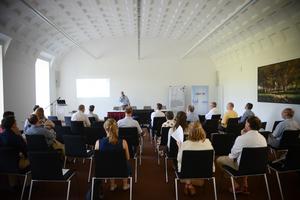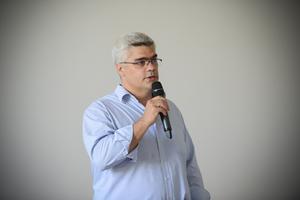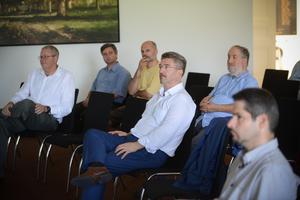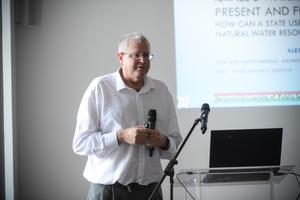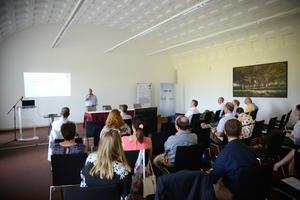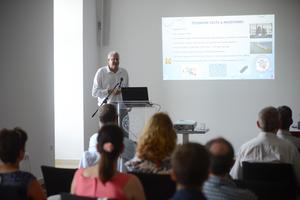In the framework of the Climatters 2018 climate and sustainable development policy conferences Prof. Alex Furman, water expert from the Israel Institute of Technology held a lecture on 20 June at the Ludovika campus.
The Israel Institute of Technology - or in short Technion - is Israel’s oldest university. Prof. Furman is currently working at the Civil and Environmental Engineering Department. The department combines civil engineering and agricultural engineering disciplines. Additionally, he is also the Head of the Grand Water Research Institute where he seeks to optimize the use of freshwater resources in the ground. The Institute was established 25 years ago with the aim of becoming an umbrella institution for the water sciences related researches within Technion and providing opportunities for researchers for a more effective cooperation.
“It is common that civil and chemical engineers are dealing with water science issues and many professionals from other departments are also conducting water related researches. Moreover, the chemistry, biology and mechanical engineering departments are also engaged in these matters” - explained Prof. Furman the need to establish the institute. According to the water expert, the topics that the Grand Water Research Institute is focusing on more or less overlap with Israel’s water issues. The institute’s main research areas cover hydrology and wastewater treatment but they also seek to meet the state’s requirements and needs and research the areas that are also important on state level. Therefore, nowadays the key focus area is desalination and the relevant processes.
“These days, desalination is a very important reseach field in my country, thus a quarter of our scientists is dealing with this topic. They have professional interest in pretreatment, membrane processes and filtration. We will not discontinue the other researches, however today these are the priorities” - described the professor the main research direction of the institute.
He underlined that beside the questions of desalination, they are engaged in other areas such as general water management, urban water management and water quality. The institue currently has 60 researchers.
Apart from the researches, the professionals at Technion are also cooperating with external partners. They train high school teachers on water management and participate in several international projects. They have Chinese, American and African partners and strongly cooperate with Jordan. Apart from conducting researches, the institute’s other mission is to transfer knowledge.
“Water is a global issue” - highlighted the presenter. The climate change has already created challenges worldwide, not only in desert regions. Even Central Africa can suffer from water scarcity even though that region is not dry. The reason of that is, according to Prof. Furman, the inappropriate use of water resources. The geography and the climate of Israel also encourage the Jewish state to pay particular attention to water supply issues. According to the expert, this explains why the Israeli institution is one of the best water management research centers. The methods and processes that they have experimented can be directly, or with slight adjustments, implemented in other countries’ best practices. And this can help them understand the results of the experiments and also learn from the mistakes that the researchers at Haifa have previously made. The most precipitation can be observed in the eastern Mediterranean Basin, in the North of Israel and in Lebanon. However, the major part of the country has significantly less precipitation, especially in the Negev desert in the southern region of Israel which covers more than half of Israel land area. Even though the rainfall in the northern region is generally less than what is measured in Budapest, the main difference is not in the amount of precipitation. Israel as well as other Mediterranean states have to face water issues due to heavy evaporation. Because of the evaporation, it is not worth to maintain open-air water reservoirs.
“In terms of population density, some of our districts may be compared to Hong Kong. Approximately 8.8 million citizens live in 25 thousands square meters, but because of the geographical conditions the population density is very low in the shouthern part of the country while in the north it is much greater” - said Prof. Alex Furman. Historically, this area has been able to supply 2 million people, but today the population is four times bigger and this makes water supply a serious challenge. The audience could also learn that in 1947 right before the creation of Israel, only 650 thousand people lived in the area. Five years later the population has doubled. Additionally, the European immigrants were dealing with agriculture and the main activities in the kibbutz required a lot of water as well. The increased demand has encouraged enhancement and development and continues to do so even today.
“During the twenty years following the formation of Israel we mainly worked on the development of our water resources. Later we realised that the increasing population required more and more resource therefore we have started to focus more on the proper and economic water management” - summarised the presenter the situation. To save water, the experts have developped a so called drip irrigation. With this method water slowly drips to the roots of plants, either from above the soil surface or buried below the surface which is more effective than the traditional surface-applied irrigation. This irrigation type also results in financial savings and provided a better crop/used water ratio. Beside the agricultural developments, the citizens try to save freshwater in public education and in their every day life. They educate the population with different school programmes from very young age and state institutions are also focusing on the reduction of their water footprint.
In his conclusion, Prof. Furman summarised the path that his country has taken since 1947 and he highlighted that they have great accomplishments although they have made some mistakes during this learning journey. Innovation will not stop at the current level, they will keep working on new processes and tools in order to comply with the ever increasing demands.
